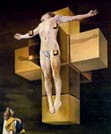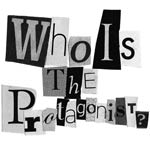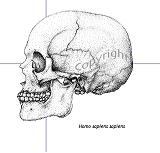The Birth of the Ultimate Narrative
Thursday, May 25, 2006 → by Danieru In past posts I have touched on the idea that we are all the protagonists in our own reality narratives. These realities interrelate in surprising ways which either enrich or contradict our individual, subjective perspectives. In organised religion can be found a selected framework through which a shared narrative is weaved. Myth is a powerful force rendering our existentially meaningless lives into a stronger composite than any one of us maintains alone.
In past posts I have touched on the idea that we are all the protagonists in our own reality narratives. These realities interrelate in surprising ways which either enrich or contradict our individual, subjective perspectives. In organised religion can be found a selected framework through which a shared narrative is weaved. Myth is a powerful force rendering our existentially meaningless lives into a stronger composite than any one of us maintains alone.Perhaps in Christianity Jesus is the leading protagonist. In his story Christianity's followers catch reflections of themselves which dimly accentuate their favourite curves, their preferred self maintained attributes. The myth is a powerful force indeed.
 Scientific enquiry renders theological concerns nigh on extinct when we ask materialistic questions:
Scientific enquiry renders theological concerns nigh on extinct when we ask materialistic questions:- Why do we die?
- How old is the Earth?
- What is matter composed of?
The true understanding science can bring us in these areas is unsurpassed in the history of human thought. Yet if we attempt to analyse our subjective worlds with this scientific framework its power remains accessible to a relative elite.
I have grown to loath the word 'scientists' of late, so padded full is the media of this gross generalisation. Thus a rarely understood mass of society casts a single, collective shadow from which a lonely protagonist is wrought. All work in the sciences then, as far as our media tells us so, is maintained as the work of one 'super-science' - a conglomerate's power with a fake protagonist's glory; knowledge but no myth.

This is dangerous.
I believe that the current failure of the scientific community is in understanding their potential. If science is to overcome the dogma of religion - a problem which can only grow exponentially with time - a myth needs to be wrought.
In the hyperreal communities of the internet I see the potential for the greatest over-arching narrative in the history of humankind. Through the interplay of chaotic forces far beyond the reaches of our understanding religion of all kinds places the cogs of our society into various working machines of change. Today, as the time scales inherent in change become narrower and narrower, mythological structure has not the time to emerge. Science the protagonist, standing so heroic in many areas of our world story, still appears lost in a sea of chaotic forces none of us are capable of grasping. This allows religion to strike back, raise its head in pride and laugh in the face of scientific adversary. Dogma may shield us from the lies, but surely it ties us together tighter than any myth-less narrative.
- So I ask you:
- How should the scientific community construct the narrative to end all narratives?
- Will the internet act as its theological framework or is society best maintained in the flesh and bone relationships religion has manipulated so well?
- Could there ever rise a scientific-messiah from the chaos of modern, objectively governed society? and, if the ultimate narrative does arrive, what form will/should it take?

and finally...
Categories: Science, Religion, Ideas, Society, Human, Reality, Evolution, Internet, Perception, Myth, Philosophy, Life, Fiction
|
|

 Links
Links Subscribe via RSS!
Subscribe via RSS!


 Via Email
Via Email


Even if such a thing is to be attempted as a 'strike' against religion, doing so without the guarantee of an 'all powerful' narrative that is both 'all answering' and air tight is a questionable one.
Science does not and cannot answer all the questions religion answers
and it shouldn't be made to sound like it does.
Science only offers a world of based on uncertainty. something people find it hard to accept.
Yet to be a part of it, it is not for a narrator to weave another wonderland.
All that's needed is for them to come to realise the wonderland they're already in.
November 19, 2007 11:53 AM
Post a Comment